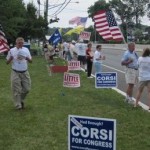SOTU = The Old Razzle Dazzle. “When you’re in trouble go into your dance.”
“Give ’em the old razzle dazzle” goes the refrain to one of the most entertaining and memorable scenes from the play “Chicago.” It seems President Obama drew inspiration from the production named after the city in which he began his political career.
Unlike many who have derided his performance as “flat,” I found it to be reasonably dynamic. It was passionately delivered and vague enough to be inoffensive. The bipartisan applause lines and sprinkle of humor were injected to create the impression that the president was humble and not asking for anything illogical. Just the good old post-partisan and centrist Obama from the campaign days. As the song “Razzle Dazzle” continues, “when you’re in trouble go into your dance.”
At points, I felt as if the President had become a subscriber to our paper and was reading my editorials. A few “Did he really say that?” moments include his calls to: eliminate the 1099 penalty from the health care law, cut the corporate tax rate, reduce frivolous lawsuits, simplify the tax code, and scale back burdensome and archaic regulations on business. If this was his State of the Union two years ago, it may have been remotely believable.
It didn’t take long to realize that the speech was to serve mostly as a distraction from the reality of the president’s agenda for the past two years, and his designs to do more of the same in the next two: more spending, bigger government and completely ignore entitlement reform.
During a meeting with business executives I attended last year, the consensus in the room was that President Obama was smart to jam and ram through the most unpopular and controversial aspects of his agenda in his first two years in order to focus on getting re-elected over the next two. While most opposed the policies, they recognized the virtues of the tactics. The “ram it through” strategy was made even more appealing considering the overwhelming majorities the president’s political party held in Congress.
But that strategy has consequences when the agenda does not represent the “will of the governed,” and primary among the casualties is the president’s desire to be viewed as either a centrist or post-partisan. Unfortunately for Mr. Obama, his speech was undermined by the lack of his own credibility on the most critical issues he mentioned; job creation, deficit reduction and tax reform. That tension showed up in the speech itself. Even liberal columnist Paul Krugman commented in the New York Times on the speech: “We’re going to invest in the future — but we’re also going to freeze domestic spending. …I have no idea what the vision here was.”
Anticipating Republican charges that “investments” he promoted in his address were merely code for new federal spending we can’t afford, the president fashioned a pithy defense: “To borrow an analogy, cutting the deficit by cutting investments in areas like education, areas like innovation — that’s like trying to reduce the weight of an overloaded aircraft by removing its engine,” Mr. Obama said in a December speech at a community college in North Carolina. “It’s not a good idea.”
But in this defense lays the principle difference between Republicans and Democrats. The president and his Party believe the “engine” is the government and its bureaucracy, while Republicans believe the driving force comes from private enterprise and the American entrepreneur.
The unemployment problem facing our nation has made a sustainable and meaningful economic recovery very difficult. However, identifying the greatest impediment to resolving it is far clearer; it’s the uncertainty created by new government policies and burdensome regulations. In a two year period, private industry has endured the prospect of new health care mandates, attempts to regulate energy usage through a carbon tax, counter-intuitive financial regulations and the probability of the largest tax increase in American history in two short years.
Is it a wonder that corporate America is sitting on nearly $2 trillion in earnings, rather than investing in their own expansion? Without knowing what to expect over the next two years, the risk takers and job creators have had to assume a more defensive posture, relegating them unable to do what our economic system and workforce needs them to do, which is to grow and create jobs.
Rhetoric cannot replace a record of real achievement. After two years of “razzle dazzle,” the American people must demand more from this president.

 By Diane Gooch
By Diane Gooch








I believe Diane Gooch is dead on on her observations on why the economy is sick. As someone who is in the investment business (municipal bonds/stocks) I represent wealthy individuals who in the right enviorment would be willing once again to venture out and particpate in an expanding economy. Until then why bother? Capitalism is a good thing. Do they teach that in our schools anymore? I guess Obama was spending too much time being a volunteer at Acorn to grasp this concept.
Change the political leadership and the wealthy of this nation will come out and play.
…..When President Obama told the nation his revised policy on Afghanistan he indicated that Americas mission in that country is not open-ended in duration that we will leave when our objectives have been accomplished and that the objectives are worth the sacrifices. Obamas primary goal is the destruction of the Taliban insurgency against the corrupt Karzai government.The president should have addressed the problem of corruption within the government of Afghanistan President Hamid KarzaiHamid Karzai and explain why the C.I.A.